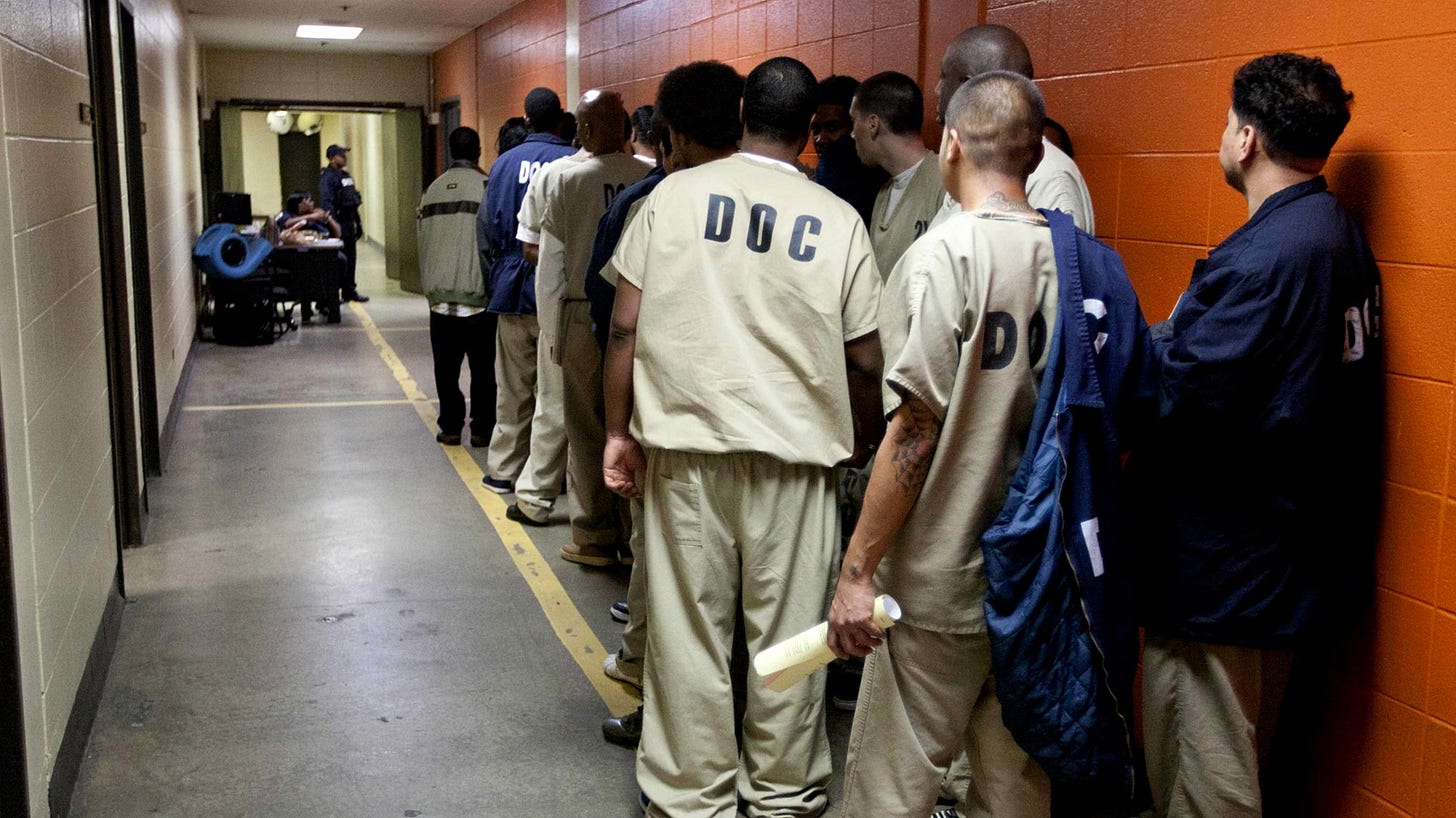THE ILLINOIZE...Monday Free for All...The end of cash bail...How to deal with crime...Issues mount for Hastings
September 19, 2022
Good morning, Illinois.
Welcome to another work week. There are 50(!) days to the General Election. There are 57 days to veto session and 112 days until whoever wins in November takes the oath of office for Governor of Illinois.
For you early risers, I’ll be in with Steve Cochran on WLS in Chicago around 6:05 this morning. You can listen online here.
Gov. Pritzker will be endorsed by LiUNA this morning at 10:30 in the Austin neighborhood. The Bailey campaign has not released a public schedule.
For those of you that have been on the fence about joining us as a paid subscriber, you should know subscribers saw Darren Bailey’s taxes and found out changes to the cash bail law were being negotiated before anyone else last week.
A paid subscription is just $99 per year or $9.99 per month. We think that’s well worth the price of admission, especially considering the racket some of the other sites are. Just click below to subscribe!
If you have any questions or comments, please drop me a note at patrick@theillinoize.com.
Let’s get to it.
YOUR MONDAY FREE FOR ALL
(note: we’re not responsible for paywalls and restrictions from other news outlets)
What happens when cash bail ends? (Capitol News Illinois)
Beginning Jan. 1, 2023, cash bail will be abolished in Illinois.
The measure that will eliminate it has been on the books since early 2021, giving the justice system two years to plan for the major overhaul of the state’s pretrial detention system.
It’s also given time for the measure to become politicized to a point where the reality of the law has become indistinguishable from the political rhetoric surrounding it.
“As I've said many times, what we want to make sure doesn't happen is that someone who's wealthy and commits a terrible violent crime – it could be, by the way, a wealthy drug dealer – doesn’t have an easy time getting bail compared to somebody who maybe commits shoplifting and for a couple of hundred dollars is stuck in jail,” Gov. JB Pritzker said at a news conference in August.
But opponents and advocates of the reform agree that, beyond simply ending cash bail, the law seeks to reduce the number of people incarcerated before a guilty verdict by limiting the circumstances in which a judge can order pretrial detention.
Republicans and state’s attorneys have continued to fight for changes to the law, up to a full repeal, arguing that while the intent may be to empower judges to detain more dangerous individuals, the bill as written is too limiting.
“It is frustrating because many aspects of the statute are not clear,” retired Judge Robbin Stuckert, who chairs the Pretrial Implementation Task Force, said at a July town hall meeting. “They may be vague, gray areas. And again, we are charged by the Supreme Court to assist with implementation.”
The law’s sponsors in the General Assembly said they are working with the task force on legislation clarifying some of those matters – particularly when it comes to detainable offenses – for potential passage this fall.
State’s attorneys have been the most vocal critics of the law as written, arguing that it leaves too little leeway for judges to detain dangerous individuals in certain circumstances.
Among them is Republican DuPage County State’s Attorney Bob Berlin, who said he was not opposed to ending cash bail in principle.
“I want to stress, this is very fixable,” Berlin said. “I'm not one of the people out there saying ‘Oh, repeal repeal, just get rid of it.’ We can fix this. And we can fix it before January 1.”
Related: House Democrats, prosecutors negotiating changes to cash bail law (The Illinoize)
Opinion: Elimination of cash bail brings us closer to real justice (Rockford Register Star)
Opinion: Chesney: Illinois’ SAFE-T Act’s impact on crime (Shaw Media)
Opinion: West: On Jan. 1, pre-trial detention will rely less on money, more on Illinois judges (Rockford Register Star)
Rep. West on cash bail (The Illinoize)
Editorial: McDonald's CEO issues a needed call to action on crime (Crain’s Chicago Business)
McDonald’s is committed to Chicago.
That was the reassuring takeaway from CEO Chris Kempczinski’s Sept. 14 remarks before the Economic Club of Chicago. The fast-food giant—the most globally prominent name in the Chicago business landscape, a company founded and nurtured in the area—sees staying here as a smart long-term strategic decision.
Kempczinski’s remarks in their totality also contained subtle and not-so-subtle details that should be keeping civic leaders awake at night—and also served as a call to action for a business community eager to rally around a strategy, any strategy, that would reverse the reputational damage Chicago has suffered in recent years.
For one thing, Kempczinski was bracingly forthright on the matter of corporate recruitment. In frank terms, he openly told the Economic Club that he’s fielded calls from other cities and states trying to woo him and his headquarters away from the Windy City. He’s listened to those pitches and considered them, as any CEO with a duty to both shareholders and employees should. So far, he has been unmoved by the offers—though the challenges his business is experiencing here in Chicago have certainly given him pause.
Kempczinski was blunt: Chicago’s reputation for crime has made it harder to recruit talent to McDonald’s West Loop headquarters than it was just a few years ago. It’s made it harder to get workers to come back to the office. And as he travels around the world on business, people regularly ask him, in concerned tones: “What’s happening in Chicago?”
Whether Chicago actually deserves its reputation for crime or not, based on the statistics, is almost irrelevant. “In our business, other people’s perception becomes our reality,” Kempczinski pointed out. “We have to act like it’s the reality, whether we believe it or not.”
And that’s where potential solutions come into play. Calling for a show of hands, Kempczinski asked his audience of CEOs, executives and civic leaders how many of them are aware of the city’s plan to improve public safety. For the record, few hands went up. And that’s a problem. Business leaders all around Chicago stand ready to collaborate with City Hall to improve everything from street-level safety to infrastructure to economic development to selling out-of-town CEOs on the benefits of coming to Chicago. But the Lightfoot administration must set the agenda and articulate a strategy.
“Let us know the plan so we can support it,” Kempczinski said. “It’s going to take partnership.”
Related: Opinion: My wife and I were robbed at gunpoint. I understand the ugly aims of the ‘Lakeview Scream’ ad. (Chicago Tribune)
Durbin weighs in on threats against law enforcement after Trump raid (Crain’s Chicago Business)
Opinion: A shrill 'Scream,' but are Illinois voters listening? (Champaign News-Gazette)
POLITICAL POTPOURRI
State Sen. Michael Hastings, whose wife accused him of domestic violence, faces mounting political, personal issues (Chicago Sun-Times/WBEZ)
Why Gov. J.B. Pritzker’s administration ended up giving millions of dollars to relatives of his Republican rival, Darren Bailey (Chicago Tribune)
Chicago’s chances of getting Democratic National Convention looking better and better, top source says (Chicago Sun-Times)
In visit to Illinois, VP Harris rallies voters around abortion rights (Capitol News Illinois)
Nearly 200,000 Illinoisans have received the updated COVID booster (WBEZ)
Planned Parenthood expanding in Champaign as Indiana ban takes effect (Crain’s Chicago Business)
Poll shows Congressman Chuy Garcia in strong starting position if he runs for Chicago mayor (Chicago Sun-Times)
SOME TOP LINKS FROM LAST WEEK
JOIN US











